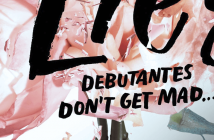My relationship with my mom was never easy. Even in her death, I struggle to verbalize the kind of relationship we had. And even harder still is trying to communicate that to others.
The best I know how to describe it is with one word: isolating.
As a teen, I didn’t talk about the things that went on at home.
How do you tell your friends your mom isn’t someone you can trust? How do you tell them being kicked out of your home is an actual thing that occurs and it happens monthly?
For me the answer was simple: you don’t.
For teens with parents struggling with mental health and addiction issues, especially those in single parent homes, things are often never as easy as getting your parent help or leaving for a healthier environment. There’s a complex web of emotions, history, legalities, and family dynamics to unpack. And that’s just the tip of the iceberg.
What will happen to said parent if you confide in another adult who can and will do something about the situation? How will that impact your life? Removal from your home? Switching schools? Leaving your friends? Tearing apart your relationship with your parent, damaging not only your relationship with them but, potentially, relationships with other family members?
 Although those were questions I was never able to answer and I’ve never truly been able to resolve the feelings I have toward my mom, I was able to see my experiences as a teenager reflected in the pages of Ashley Herring Blake’s How to Make a Wish.
Although those were questions I was never able to answer and I’ve never truly been able to resolve the feelings I have toward my mom, I was able to see my experiences as a teenager reflected in the pages of Ashley Herring Blake’s How to Make a Wish.
For some, Grace’s mom Maggie may be hard to handle and easy to judge. I’ve read reviews that have said as much. Some called Maggie a mess. Others said moms like that don’t exist.
Those statements are easy to make for those on the outside looking in.
The judgment passed on Maggie – and sometimes even Grace – was one of the main reasons I kept my lips sealed about things that went on between my mom and me.
But reading How to Make a Wish by Ashley Herring Blake made me – finally – feel seen. Within the pages of the novel, the teenage version of me saw herself and felt like, maybe, someone understood.
For someone who felt alone for years, strangled in the complex web of emotions toward her mother, that was everything.
For someone who still feels isolated in my experiences with my mom, even after her death, it means more than I can put into words.
Like Grace, I kept people at arm’s length. Throughout my four years in high school, I had only two best friends and the rest of the people in my life were a revolving stream of acquaintances. People I’d hang out with because they were friends with one of my best friends or friends of friends of one of my best friends.
Similar to Grace’s relationship with Jay, the one serious boyfriend I had knew next to nothing about my mom; I liked to keep them in separate orbits around me, minimizing their chance for collision.
While not a complete parallel, many moments within How to Make a Wish were moments I experienced, too. Any time I had money, some of it would go missing. She brought me into environments with strange men and paraded them around our small two-bedroom apartment — men who made me uncomfortable and made me all too aware of my body and how it moved. Though she was excited that I would be the first in our family to attend a four-year university, she often used it against me. She said I was too proud for our working class family, that I was ashamed of them. She even used it as leverage, threatening that if I didn’t do what she wanted or act how she wanted, she’d make damn sure I didn’t get the college education I so desperately desired.
I remember all of it. Some moments are keener than others and those form the memories of my childhood half-life.
But clearer than any one memory I have is how I felt – exactly how I feel now as I type this – like someone was stepping on my throat, holding my heart hostage in their hand, squeezing every now and then just to see me wince.
In some ways, I’m a little envious of the ending of Blake’s novel. Though we never see things through to fruition, there’s a chance for a happy ending between Grace and her mom — chance for an ending my mom and I can never have.
“We read to know we are not alone,” is a famous quote by William Nicholson, though it’s often misattributed to C.S. Lewis. Because of How to Make a Wish, because of Ashley Herring Blake, I know I am not alone.
I hope teenagers find this book and know that neither are they.




